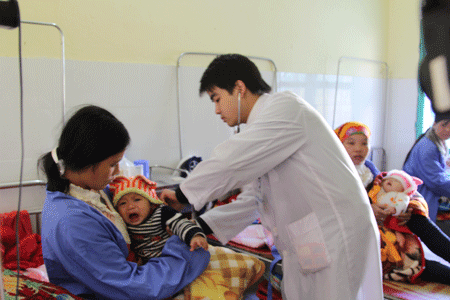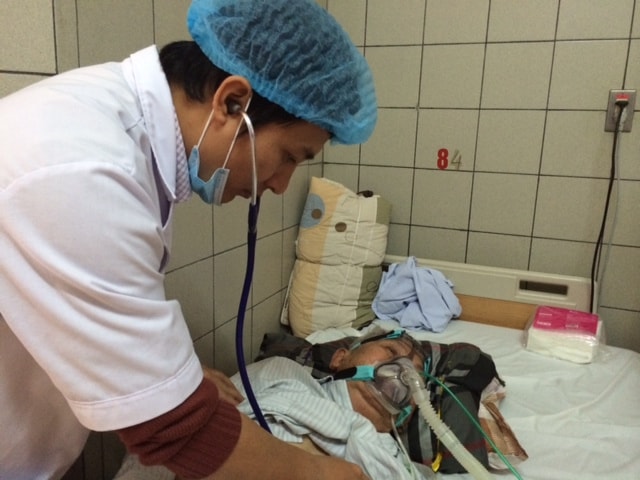Northeast monsoon "fuels" worsening respiratory diseases
At hospitals, the number of patients coming for examination for respiratory infections, pneumonia complications, and chronic obstructive pulmonary disease increased by about 20% due to the prolonged cold and humid weather.
5 days old had pneumonia
 |
| Examining a child with pneumonia at Thao Nguyen General Hospital (Moc Chau, Son La). Photo: H.Hai |
On the night of December 17, the Pediatrics Department (Bach Mai Hospital) admitted a 5-day-old newborn with pneumonia. The patient was brought to the hospital by his family because he was not feeding well, had difficulty feeding, had rapid breathing, and had a sunken chest. The patient was immediately admitted for treatment.
According to Associate Professor, Dr. Nguyen Tien Dung, Head of the Pediatrics Department (Bach Mai Hospital), the cold spell that has lasted for more than 10 days with low temperatures and humid rain has caused many children to suffer from respiratory tract infections. The number of children coming to the clinic and being hospitalized has increased by about 20% compared to normal. In particular, most of the children have upper respiratory tract infections, colds, high fever, especially many infants and young children have complications of pneumonia.
Cases of pneumonia in young children and infants are very severe, requiring hospitalization for monitoring and treatment. Such is the case of baby NVA (25 days old in Giap Bat, Hanoi). After birth, the baby had digestive disorders, passing stools an average of 20-25 times a day. After being examined at the National Children's Hospital, the doctor determined that the baby had signs of mild breast milk allergy, so they reduced breast milk consumption, combined it with formula milk, and then gradually increased the amount of breast milk each day. Thanks to that, the baby's passing stools were reduced to 10-12 times a day.
“However, when my baby got sick, it was during a severe cold spell. Although I was aware of the cold, I turned on the heater every time I took him out to wash him and change his diaper, but he still caught a cold. Now I have to treat both my breast milk allergy and antibiotics to treat pneumonia,” Mai Lan said worriedly.
Prof. Dr. Nguyen Tien Dung, head of the Pediatrics Department (Bach Mai Hospital), said that pneumonia in young children, especially infants, does not manifest as loudly as in older children, so recognizing the signs is very difficult. Unlike pneumonia in older children with typical symptoms of high fever and severe cough, in children under 6 months old, pneumonia progresses very quickly and the signs are often atypical and easily overlooked. For children under 6 months old, fever and cough are not important signs, even many children do not have fever (only a slight fever) and do not cough but have very severe pneumonia.
“Pneumonia in children under 6 months old, especially newborns, progresses very quickly. There are children who do not show signs of pneumonia at the time of examination, but only a few hours later, they show signs of chest retraction and rapid breathing. It is very difficult to diagnose pneumonia in infants just by listening to the heart and lungs, and it is very difficult to detect the incubation period. There are no typical signs of older children such as cough and fever. In infants under 30 days old, pneumonia can even lower body temperature a little, "calm" without coughing or runny nose. Therefore, it is very important to observe the baby's general condition, especially the baby's feeding status. If the baby feeds less than usual, sleeps a lot and is unusually lethargic... parents need to observe the baby's breathing and chest and see if there is anything unusual, then take them to the hospital for examination,” said a newborn specialist.
The elderly also suffer from respiratory diseases.
 |
| Chronic obstructive pulmonary disease patients are increasing. Photo: H.Hai |
On the afternoon of December 17, the Respiratory Center (Bach Mai Hospital) received an 80-year-old man with respiratory failure due to an acute exacerbation of chronic obstructive pulmonary disease. The patient was intubated, put on a ventilator, and transferred to the Intensive Care Unit due to his severe condition. This patient was diagnosed with chronic obstructive pulmonary disease a year earlier and had been taking medication daily, but the prolonged cold spell had caused the disease to flare up.
According to Dr. Chu Thi Hanh, Deputy Head of the Respiratory Department, cold air is like a stress factor for the body, thereby triggering chronic respiratory diseases and acute episodes of this disease in the elderly.
“Cold air has a negative impact on the respiratory tract. The sudden change in temperature makes patients with chronic respiratory diseases susceptible to acute attacks, and in a cold season, not to mention the humid environment, which creates favorable conditions for bacteria and viruses that cause flu and pneumonia to thrive and easily attack patients. Especially for patients with chronic obstructive pulmonary disease, cold weather like now is one of the risk factors that make chronic lung disease patients have acute attacks. Every winter, the hospitalization rate of patients with chronic obstructive pulmonary disease is 20-30% higher than other seasons,” said Dr. Hanh.
At the Respiratory Department, the number of patients with chronic obstructive pulmonary disease treated in the respiratory department is about 25 - 30% of the total number of patients. There are times when the highest number of patients is up to 220 inpatients/day.
According to Dr. Nguyen Trung Anh, Head of the Examination Department of the Central Geriatric Hospital, during cold weather days, some chronic diseases will increase more than usual. Common diseases in the elderly in this cold weather are high blood pressure, myocardial infarction, coronary artery disease, lung disease, bronchial disease, chronic obstructive pulmonary disease, bone and joint diseases and the risk of malnutrition.
Dr. Hanh recommends that, to prevent disease in the elderly, people should not leave the house early in the morning. When leaving the house early in the morning, people must wear warm clothes, keep their necks warm, wear hats, and wear masks. When staying at home, they should also keep warm, close the doors, and ensure a stable temperature that is not too cold. They should eat warm, hot foods, and not eat cold foods. If there are ear, nose, and throat infections, they must be treated thoroughly, otherwise they will spread to the lower respiratory tract, causing the risk of new attacks. Each attack of a patient with chronic obstructive pulmonary disease is a "horror" for both doctors and patients, because the patient's respiratory failure is very severe, threatening death. The patient must change routine treatment, be hospitalized, thereby increasing the risk of hospital infection, falling into depression, and reducing the quality of life...
According to dantri






